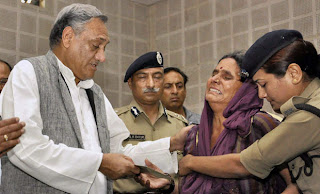Couple of days back a friend working with an international non-profit organization that focuses on children's issues, sent me a mail about a missing family in the tragedy of 16 - 17 June that took away the lives of more than 5,000 people. This family was still searching for their only son who had disappeared along with his wife and an young son of about 12 years old since 17 June. I replied that the mail was incomplete if it has to be shared with any of the districts or state officials on missing persons. Later I got a call from this family. ( For the sake of this post, I shall call it Jenny's family.) When Jenny called me I was heading for a meeting, and so I scheduled to speak to her later on 19th afternoon. This post is all about that conversation that left me numb.
Jenny is married and well settled with her family along with her father. It is the story of her missing brother and his family that they are searching for as her father is inconsolable. I took details about the missing persons. Then I heard her speaking about children....women. I said "But wasn't only your brother and his wife and their single son involved?" She said, "Yes, but my uncle's family too traveled along with them." "So, how many were they?" She said, my uncle died sometime ago. My aunt along with her five daughters, their husbands and 7 children (total 18) of them and my brother, his wife and the son (that makes it 21) traveled from Delhi to Haridwar, and from there they traveled by a vehicle to upper hills. They had visited Badrinath around 15th and then on 16th they were in Kedarnath after trekking the mountains from Gourikund. They had called us after the darshan (worship). As it was raining, they decided to stay back in Kedarnath thinking that it would be difficult to trek back the 14 kilometers on the mountains with all the children in the rain. They thought it is better to stay in a place where there are lot of people in stead of getting stuck at a smaller place on the way. Since 17 June, we have not heard from any of them."
With my throat already dry, I asked her calmly, "I am very sorry to hear about this. You mean 21 persons in a single family have been just missing for the last four months?" She replied, "Yes Sir. Each day is a silent hell in our life. The rest of the family, all of us, find it even difficult to speak with one another. It is too much of SILENCE at home. None of us have much to speak to each there. With what words can any one comfort the other?"
I sympathized with her and told her that from my present position I can only share her story with the government and tell them to see if the matter can be expedited as early as possible. I checked with her if they had filed the missing person report with the police, and if inquiry has been completed, for which she replied positively. I checked if they gave DNA samples. She replied that it was not done as the Doon hospital that was handling was over crowded, it was an eternal wait for a whole day.
A whole family had been silenced. Silenced along with the thousands, leaving many more to remain in silence as they keep waiting for their beloved ones, who may never return. The trauma of the remaining members of similarly affected families would take decades to heal. Until then, pray that these families find solace in the company of good friends.


